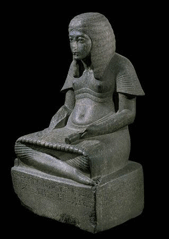| Hieroglyphs |
![]()
![]()
Who wrote hieroglyphs?
| Scribes |
|
How a scribe started writing |
| A special class of Egyptians could write.
We call them scribes. They learned in school just like children
today, but not in the same way.
When they were fully trained they could get a job as a scribe. If they were talented and worked hard - and knew the right people - they could go far. Maybe even right to the top - to being pharaoh! See the story of Horemheb later. |
This picture shows a scribe writing.
Scribes would sit cross-legged, to make a sort of table with their kilt.
Before writing the scribe would make an offering to the god of scribes, Thoth. He would dip his pen in his water pot and cast a few drops on the ground while saying a prayer. |
|
| 'Sesh' |
 |
Proud of their Jobs |
| The Egyptian word for scribe was sesh. It
was written like this:
The hieroglyph shows the kit a scribe needed to write with - the rush pen, the water pot, and the palette of paints. It was also the hieroglyph used for 'write'. |
Egyptian scribes were very proud to be
scribes. They could advance through many levels and have lots of job
titles, and they would have all of these inscribed in their tombs.
This picture shows Horemheb, an army scribe who lived at the same time as Tutankhamun. Eventually he became King's Secretary, then Commander- in-Chief of the Army, then King's Deputy, and then King! Scribes did not have to pay taxes, nor did they have to do any hard work in the fields, or building things. So compared to many people they had an easy life. |
|
| Bored of their jobs! | A New Kingdom Text: how a scribe lived forever | |
|
In truth, though, most scribes had pretty boring lives. They had to do lots and lots of copying of boring stuff, like records of everything made by workshops, everything traded, everything brought into a temple, and so on. And most of them never wrote their names down, so they have been forgotten. The quote to the right from an old papyrus tells us how they hoped to live on through their work. |
'As to those learned scribes from early days, they who foretold the future, their names have become everlasting even though they themselves have died and all their family are forgotten. They did not make for themselves enduring tombs and stelae, they left no children to remember their names. They made heirs for themselves out of the books which they composed...though their houses have crumbled and their graves are forgotten, as long as their name is spoken through the books which they made when they lived, happy will be the memory of their authors. It is for ever and all time!' |
The god Thoth as a baboon watching over a scribe |